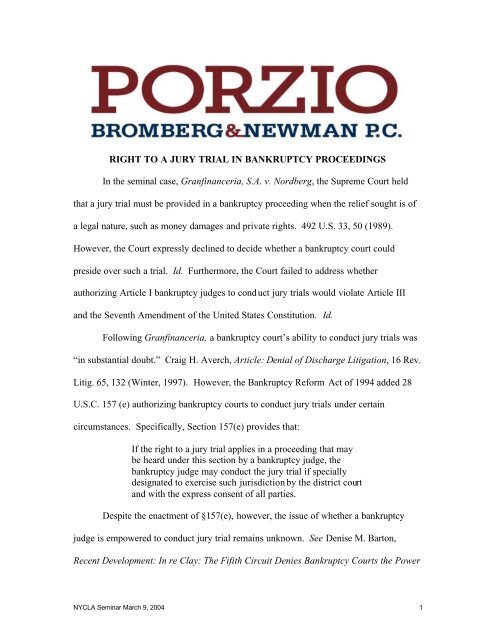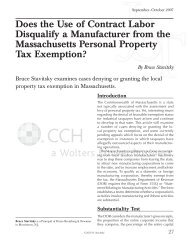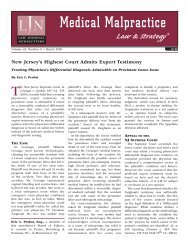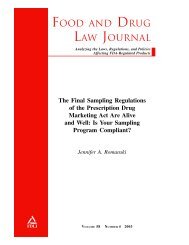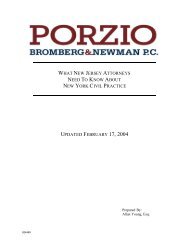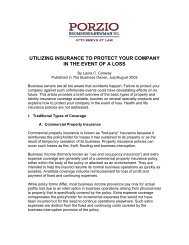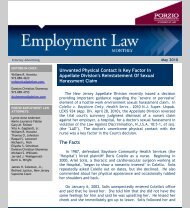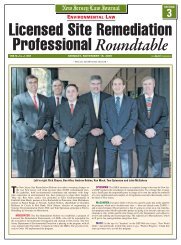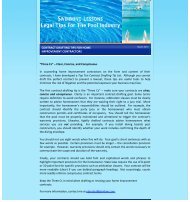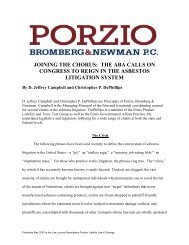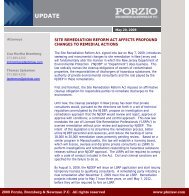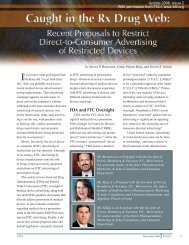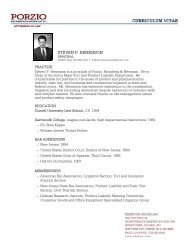RIGHT TO A JURY TRIAL IN BANKRUPTCY PROCEEDINGS In the ...
RIGHT TO A JURY TRIAL IN BANKRUPTCY PROCEEDINGS In the ...
RIGHT TO A JURY TRIAL IN BANKRUPTCY PROCEEDINGS In the ...
Create successful ePaper yourself
Turn your PDF publications into a flip-book with our unique Google optimized e-Paper software.
<strong>RIGHT</strong> <strong>TO</strong> A <strong>JURY</strong> <strong>TRIAL</strong> <strong>IN</strong> <strong>BANKRUPTCY</strong> PROCEED<strong>IN</strong>GS<br />
<strong>In</strong> <strong>the</strong> seminal case, Granfinanceria, S.A. v. Nordberg, <strong>the</strong> Supreme Court held<br />
that a jury trial must be provided in a bankruptcy proceeding when <strong>the</strong> relief sought is of<br />
a legal nature, such as money damages and private rights. 492 U.S. 33, 50 (1989).<br />
However, <strong>the</strong> Court expressly declined to decide whe<strong>the</strong>r a bankruptcy court could<br />
preside over such a trial. Id. Fur<strong>the</strong>rmore, <strong>the</strong> Court failed to address whe<strong>the</strong>r<br />
authorizing Article I bankruptcy judges to conduct jury trials would violate Article III<br />
and <strong>the</strong> Seventh Amendment of <strong>the</strong> United States Constitution. Id.<br />
Following Granfinanceria, a bankruptcy court’s ability to conduct jury trials was<br />
“in substantial doubt.” Craig H. Averch, Article: Denial of Discharge Litigation, 16 Rev.<br />
Litig. 65, 132 (Winter, 1997). However, <strong>the</strong> Bankruptcy Reform Act of 1994 added 28<br />
U.S.C. 157 (e) authorizing bankruptcy courts to conduct jury trials under certain<br />
circumstances. Specifically, Section 157(e) provides that:<br />
If <strong>the</strong> right to a jury trial applies in a proceeding that may<br />
be heard under this section by a bankruptcy judge, <strong>the</strong><br />
bankruptcy judge may conduct <strong>the</strong> jury trial if specially<br />
designated to exercise such jurisdiction by <strong>the</strong> district court<br />
and with <strong>the</strong> express consent of all parties.<br />
Despite <strong>the</strong> enactment of §157(e), however, <strong>the</strong> issue of whe<strong>the</strong>r a bankruptcy<br />
judge is empowered to conduct jury trial remains unknown. See Denise M. Barton,<br />
Recent Development: <strong>In</strong> re Clay: The Fifith Circuit Denies Bankruptcy Courts <strong>the</strong> Power<br />
NYCLA Seminar March 9, 2004 1
to Conduct Jury Trials Without Consent of <strong>the</strong> Parties, 69 Tul. L. Rev. 1703, 1712 (June,<br />
1995). Section 157(e) is “largely untested by <strong>the</strong> courts and raises similar constitutional<br />
issues to those that plagued jury trial provisions under earlier statutes.” Id; See also<br />
Lawrence Ponoroff & Stephen Snyder, Can Bankruptcy Judges Conduct Jury Trials?,<br />
Commercial Bankruptcy Litigation § 3:21 (2002) (discussing <strong>the</strong> constitutional question<br />
lurking behind 28 U.S.C. § 157(e) but suggesting that consent may cure any<br />
constitutional problems).<br />
Circuit courts that have considered whe<strong>the</strong>r a bankruptcy judge may preside over<br />
a jury trial have uniformly agreed that no statutory provision ei<strong>the</strong>r expressly authorizes<br />
or prohibits such jury trials. See Janine C. Ciallela, Should Bankruptcy Judges be<br />
Permitted to Conduct Jury Trials?, 8 Am. Bankr. <strong>In</strong>st. L. Rev. 175 (2000). Yet, <strong>the</strong><br />
courts remain split on whe<strong>the</strong>r bankruptcy courts may none<strong>the</strong>less conduct jury trials in<br />
“core” proceedings, in which <strong>the</strong> action “arises under” title 11 or “arises in” a title 11<br />
bankruptcy case. Id.<br />
The Second Circuit, for example, has held that bankruptcy courts may conduct<br />
jury trials in core proceedings in <strong>In</strong> re Ben Cooper, <strong>In</strong>c. 896 F.2d 1394, 1403 (2d Cir.<br />
1990). The court found that a jury verdict in a core proceeding does not violate rules<br />
regarding appeals of bankruptcy cases. Id. <strong>In</strong> addition, <strong>the</strong> court reasoned that jury<br />
verdicts in bankruptcy courts do not violate Article III because bankruptcy courts<br />
normally have <strong>the</strong> power to enter final judgments without violating Article III. Id.<br />
The Eighth Circuit, on <strong>the</strong> o<strong>the</strong>r hand, held that <strong>the</strong> bankruptcy court has no<br />
authority to conduct a jury trial in <strong>In</strong> re United Missouri Bank of Kansas City, N.A. 901<br />
F.2d 1449 (8 th Cir. 1990). <strong>In</strong> that case, <strong>the</strong> court considered that although bankruptcy<br />
NYCLA Seminar March 9, 2004 2
judges were not expressly given <strong>the</strong> authority to conduct jury trials under <strong>the</strong> 1978 Act,<br />
Congress’ extremely broad jurisdictional grant in 1998 indicated its intent that <strong>the</strong><br />
bankruptcy court conduct jury trials. Id. at 1451-52. However, when <strong>the</strong> Supreme Court<br />
in Marathon Oil, 458 U.S. 50, struck down this broad grant of jurisdiction as<br />
unconstitutional, Congress responded with <strong>the</strong> 1984 Amendments establishing a<br />
bifurcated system dividing bankruptcy court jurisdiction between core and non-core<br />
proceedings. The United Missouri Bank in its view, concluded that <strong>the</strong> statutory<br />
language and <strong>the</strong> legislative history of <strong>the</strong>se Amendments indicated that Congress did not<br />
intend to authorize jury trials in bankruptcy courts.<br />
Like <strong>the</strong> Eighth Circuit in United Missouri Bank, <strong>the</strong> Seventh Circuit has also held<br />
bankruptcy courts may not conduct jury trials. <strong>In</strong> re Grabill Corp., 967 F.2d 1152 (7 th<br />
Cir. 1992). The Grabill court considered <strong>the</strong> 1984 Amendments and <strong>the</strong> available<br />
legislative history and held that <strong>the</strong>y contained no affirmative indication that Congress<br />
desired to authorize jury trials in bankruptcy courts. Id. at 1154. Grabill also noted that<br />
Congress had expressly conferred <strong>the</strong> power to conduct jury trials upon magistrate<br />
judges, who, like bankruptcy judges, are Article I judges. Id. at 1155. The Grabill court<br />
reasoned that since Congress had ample opportunity to expressly grant <strong>the</strong> same power to<br />
bankruptcy judges as it did to magistrate judges, and it failed to include such a provision<br />
in <strong>the</strong> 1984 Amendments, Congress did not intend to authorize jury trials in bankruptcy<br />
courts. Id.<br />
Similarly, <strong>the</strong> Third Circuit held in Beard v. Braunstein that:<br />
The Seventh Amendment limitations on <strong>the</strong> review of jury<br />
findings are not compatible with section 157(c)(1), which<br />
requires that any contested finding by <strong>the</strong> bankruptcy court<br />
must be reviewed de novo. By <strong>the</strong> Seventh Amendment,<br />
NYCLA Seminar March 9, 2004 3
any fact found by a jury cannot be reviewed de novo.<br />
Accordingly, a bankruptcy court cannot conduct a jury trial<br />
in a non-core proceeding.<br />
914 F.2d 434, 443 (3d Cir. 1990).<br />
Although <strong>the</strong> circuits are split on <strong>the</strong> question of whe<strong>the</strong>r a bankruptcy judge may<br />
preside over a jury trial in a core proceeding, all agree that a bankruptcy judge is<br />
prohibited from conducting a jury trial in a “non-core” proceeding, an action that is<br />
merely “related to” <strong>the</strong> bankruptcy case. Their reasoning is based on <strong>the</strong> fact that <strong>the</strong><br />
1984 Amendments explicitly state that a bankruptcy judge cannot enter a final judgment<br />
in a non-core proceeding unless <strong>the</strong> parties consent. See Cialella, 8 Am. Bankr. <strong>In</strong>st. L.<br />
Rev. at 195. Because of this limitation, all courts addressing <strong>the</strong> issue have held that jury<br />
trials of non-core matters must occur before a district judge unless <strong>the</strong> parties agree<br />
o<strong>the</strong>rwise. See id.; see also, Palmisano v. Briggs (<strong>In</strong> re Nor<strong>the</strong>rn Design, <strong>In</strong>c.), 53 B.R.<br />
25, 27 (Bankr. D. Vt. 1985). One clear example of such a non-core proceeding is <strong>the</strong><br />
liquidation of personal injury claims, which must be tried before <strong>the</strong> district court. See 28<br />
U.S.C. §157(b)(2)(b) and §157(b)(5); Official Committee of Asbestos Claimants v. G-I<br />
Holdings, <strong>In</strong>c. (<strong>In</strong> re G-I Holdings, <strong>In</strong>c.), 295 B.R. 211, 221 (D.N.J. 2003).<br />
Objections to claims, even to <strong>the</strong> extent <strong>the</strong>y constitute a counterclaim for<br />
affirmative relief that exceeds <strong>the</strong> creditors’ claim, can be adjudicated by <strong>the</strong> bankruptcy<br />
judge without a jury, and <strong>the</strong> bankruptcy judge can award a judgment for affirmative<br />
relief against <strong>the</strong> creditor if all elements necessary to adjudication of <strong>the</strong> counterclaims<br />
are part of <strong>the</strong> adjudication of <strong>the</strong> objection to <strong>the</strong> claim. See, e.g., <strong>In</strong> re Dietert, 271 B.R.<br />
499 (Bankr. S.D. Tex. 2002). However, <strong>the</strong> creditor retains <strong>the</strong> right to a jury trial<br />
(outside of Bankruptcy Court) with respect to any issue that need not be adjudicated as<br />
NYCLA Seminar March 9, 2004 4
part of <strong>the</strong> allowance of <strong>the</strong> claim or an objection to <strong>the</strong> claim. Id. <strong>In</strong> any event, <strong>the</strong><br />
consequences of res judicata and collateral estoppel apply to <strong>the</strong> bankruptcy court’s<br />
adjudication. Id.<br />
<strong>BANKRUPTCY</strong> COURT REMAND <strong>TO</strong> STATE COURT<br />
Parties are permitted to remove from a state court to <strong>the</strong> federal district court<br />
“where such civil action is pending” any claim or cause of action over which bankruptcy<br />
jurisdiction extends through ei<strong>the</strong>r or both 28 U.S.C. §§ 1441 or 1452. Things<br />
Remembered, <strong>In</strong>c. v. Petrarca, 516 U.S. 124 (1995). Parties removing an action from<br />
state court have <strong>the</strong> burden of proving federal jurisdiction. Certain Underwriters at<br />
Lloyd’s, London, et al. v. ABB Lummus Global <strong>In</strong>c., et al., 2004 U.S. Dist. LEXIS 1486<br />
*13 (S.D.N.Y. 2004).<br />
Section 1441 is <strong>the</strong> general federal removal section relating to federal jurisdiction<br />
based on diversity or <strong>the</strong> presence of a federal question. Section 1452 on <strong>the</strong> o<strong>the</strong>r hand,<br />
is specially designed to effect removal of claims related to bankruptcy cases, providing<br />
that:<br />
28 U.S.C. § 1452(a).<br />
A party may remove any claim or cause of action in a civil<br />
action o<strong>the</strong>r than a proceeding before <strong>the</strong> United States Tax<br />
Court or a civil action by a governmental unit to enforce<br />
such governmental unit’s police or regulatory power, to <strong>the</strong><br />
district court for <strong>the</strong> district where such civil action is<br />
pending, if such district court has jurisdiction of such claim<br />
or cause of action under section 1334 [Bankruptcy<br />
jurisdiction] of this title.<br />
This broad bankruptcy removal provision is coupled, however, with an even<br />
broader statute which permits <strong>the</strong>se removed actions to be remanded to <strong>the</strong> state court “on<br />
any equitable ground.” 28 U.S.C. § 1452(b). Courts typically weigh several factors<br />
NYCLA Seminar March 9, 2004 5
when deciding if grounds exist for remanding a case involving bankruptcy issues to state<br />
court. Dalen v. Clamage, 1997 U.S. Dist. LEXIS 16278 *17 (N.D. Ill. 1997). These<br />
include:<br />
1) <strong>the</strong> extent to which judicial resources will be<br />
duplicated or inefficiently used;<br />
2) whe<strong>the</strong>r remand will adversely affect <strong>the</strong><br />
administration of <strong>the</strong> bankruptcy estate;<br />
3) whe<strong>the</strong>r <strong>the</strong> case involves state law issues better<br />
addressed by a state court;<br />
4) comity considerations;<br />
5) whe<strong>the</strong>r <strong>the</strong>re is prejudice to unremoved parties;<br />
6) whe<strong>the</strong>r <strong>the</strong> remand lessens <strong>the</strong> possibility of<br />
inconsistent results; and<br />
7) whe<strong>the</strong>r <strong>the</strong> court in which <strong>the</strong> action originated has<br />
greater expertise.<br />
Id; See also Certain Underwriters at Lloyd’s, 2004 U.S. Dist. LEXIS 1486 at *30<br />
(S.D.N.Y.<br />
Once a bankruptcy or district court remands a case to state court, it is divested of<br />
jurisdiction. 28 U.S.C. § 1447(c); New Orleans Public Service, <strong>In</strong>c. v. Majoue, 802 F.2d<br />
166, 167 (5 th Cir. 1986). The federal court is prohibited from proceeding any fur<strong>the</strong>r<br />
regarding <strong>the</strong> claim or cause of action, and is not even entitled to vacate <strong>the</strong> order. Hunt<br />
v. Acromed Corp., 961 F.2d 1079 (3d Cir. 1992); Seedman v. United States District Court<br />
for Central District of California, 837 F.2d 413 (9 th Cir. 1988). Fur<strong>the</strong>rmore, federal<br />
NYCLA Seminar March 9, 2004 6
courts of appeals are statutorily precluded from reviewing an order of remand issued by a<br />
district court or a bankruptcy court. 28 U.S.C. §1447(d); 28 U.S.C. §1452(b). Likewise,<br />
Bankruptcy Appellate Panels are prohibited from reviewing a bankruptcy court’s grant or<br />
denial of remand. 28 U.S.C. §158(b) & (c). Personette v. Kennedy (<strong>In</strong> re Midgard<br />
Corp.), 204 B.R. 764, 768 (B.A.P. 10 th Cir. 1997).<br />
A recent Third Circuit bankruptcy case, <strong>In</strong> re Federal-Mogul Global, <strong>In</strong>c.,<br />
demonstrates <strong>the</strong> complex legal effect of <strong>the</strong>se remand statutes. 300 F3d 368 (3d Cir.<br />
2002). Federal-Mogul began for <strong>the</strong> most part in state courts around <strong>the</strong> country, when<br />
thousands of plaintiffs filed suit against United States automobile manufacturers claiming<br />
injury from brake pads lined with asbestos. Id. at 372. One of <strong>the</strong> brake pad<br />
manufacturers, Federal-Mogul Global, declared bankruptcy in federal district court in<br />
Delaware. The automakers <strong>the</strong>n began removing <strong>the</strong> thousands of claims against <strong>the</strong>m to<br />
federal court as “related to” <strong>the</strong> Federal-Mogul bankruptcy, and thus within <strong>the</strong><br />
jurisdiction of <strong>the</strong> federal courts. Id. Simultaneously, <strong>the</strong> automakers moved <strong>the</strong><br />
Delaware District Court to transfer all of <strong>the</strong> claims from <strong>the</strong> various District Courts to<br />
which <strong>the</strong>y had been removed, to Delaware under Section 157(b)(5). Id.<br />
The Delaware District Court provisionally granted <strong>the</strong> automakers’ transfer<br />
motion, but it ultimately found that <strong>the</strong> claims were insufficiently “related to” <strong>the</strong><br />
Federal-Mogul bankruptcy to support federal jurisdiction. Id. This meant that <strong>the</strong><br />
thousands of claims would be returned to <strong>the</strong> hundreds of state courts from which <strong>the</strong>y<br />
had been removed. The Delaware District Court held it could "cross-jurisdictionally"<br />
remand <strong>the</strong> claims, i.e., <strong>the</strong> matters would be remanded to <strong>the</strong> State Courts without any<br />
fur<strong>the</strong>r consideration by <strong>the</strong> District Courts to which <strong>the</strong> cases had been removed -- a<br />
NYCLA Seminar March 9, 2004 7
questionable holding given <strong>the</strong> language of Section 1452(b). The automakers appealed,<br />
challenging <strong>the</strong> district court’s cross-jurisdictional remand on procedural grounds. The<br />
Third Circuit, however, held that Section 1452(b) permits cross-jurisdictional remand.<br />
FEDERAL COURT ABSTENTION<br />
A federal district court may choose or be required to “abstain” from exercising its<br />
jurisdiction in a case involving bankruptcy matters. 28 U.S.C. § 1334(c). The standards<br />
for statutory abstention in <strong>the</strong> bankruptcy context are divided into two categories:<br />
discretionary and mandatory. However, discretionary abstention can be sought when<br />
such an action is contemplated, but is not yet filed. Sec. Farms v. <strong>In</strong>t’l Bhd. Of<br />
Teamsters, Chauffers, Warehouseman & Helpers, 124 F.3d 1999, 1009010 (9 th Cir.<br />
1997). Mandatory abstention arises where <strong>the</strong>re is a pending state court action filed<br />
before <strong>the</strong> bankruptcy filing. As explained by <strong>the</strong> Court of Appeals for <strong>the</strong> Ninth Circuit,<br />
mandatory abstention “can only exist where <strong>the</strong>re is a parallel proceeding in state court.<br />
That is, inherent in <strong>the</strong> concept of abstention is <strong>the</strong> presence of a pendant state action in<br />
favor which <strong>the</strong> federal court must, or may, abstain.” Id.<br />
Mandatory Abstention<br />
Federal courts are required to abstain from exercising <strong>the</strong>ir bankruptcy<br />
jurisdiction over proceedings where <strong>the</strong>re exists no diversity or federal question<br />
jurisdiction, <strong>the</strong> action was commenced in state court before <strong>the</strong> bankruptcy petition was<br />
filed and <strong>the</strong> case can be expeditiously resolved in <strong>the</strong> state forum. 28 U.S.C. § 1334<br />
(c)(2). Unlike discretionary abstention, for mandatory abstention to apply, <strong>the</strong>re must be<br />
a pending state court action commenced before <strong>the</strong> bankruptcy.<br />
NYCLA Seminar March 9, 2004 8
For mandatory abstention to apply, <strong>the</strong> abstention motion must also be timely<br />
brought. Robinson v. Michigan Consul. Gas Co., 918 F.2d 579, 584 (6 th Cir. 1990);<br />
Certain Underwriters at Lloyd’s, 2004 U.S. Dist. LEXIS 1486 at *20. Additionally, <strong>the</strong><br />
proceeding must be:<br />
1) based on a state law claim or cause of action,<br />
2) lacking federal jurisdiction, o<strong>the</strong>r than bankruptcy<br />
jurisdiction,<br />
3) commenced in a state forum with appropriate<br />
jurisdiction,<br />
4) a non-core proceeding, and<br />
5) capable of timely adjudication.<br />
Id. at *21; <strong>In</strong> re Dow Corning Corp., 86 F.3d 482, 497 (6 th Cir. 1996).<br />
The District Court for <strong>the</strong> Nor<strong>the</strong>rn District of New York recently found that all of<br />
<strong>the</strong> factors for mandatory abstention were met in Covanta Onondoga Limited v.<br />
Onondaga County Resource Recovery Agency, 281 B.R. 809 (N.D.N.Y. 2002). <strong>In</strong> that<br />
case, plaintiff disposal company sued defendant county agency in state court for breach<br />
of contract, breach of <strong>the</strong> covenant against fair dealing and violation of <strong>the</strong> New York<br />
state open meeting law. The relief sought was monetary damages and declaratory<br />
judgment. One month later, <strong>the</strong> disposal company filed for bankruptcy and filed a Notice<br />
of Removal to remove <strong>the</strong> state law action to federal district court pursuant to § 1452.<br />
The county agency <strong>the</strong>n filed a Notice of Motion to remand <strong>the</strong> case to state court. On<br />
<strong>the</strong> same date, <strong>the</strong> disposal company filed a motion seeking transfer of <strong>the</strong> case to <strong>the</strong><br />
bankruptcy court where its bankruptcy case was pending on <strong>the</strong> grounds that it was in <strong>the</strong><br />
NYCLA Seminar March 9, 2004 9
interest of justice and for <strong>the</strong> convenience of parties. The court held that mandatory<br />
abstention was warranted, because this case did not “arise under Title 11, nor did it arise<br />
in a case under Title 11, since <strong>the</strong> action was started prior to <strong>the</strong> filing of <strong>the</strong> bankruptcy<br />
petition, exists independently, and involves only state law causes of action, ra<strong>the</strong>r than<br />
rights created by Title 11.” Id. at 813. Applying a version of <strong>the</strong> above-cited test, <strong>the</strong><br />
court found that:<br />
Id. at 816.<br />
The case at bar meets all six conditions; (1) <strong>the</strong> state court<br />
defendant filed a timely cross motion for abstention after<br />
<strong>the</strong> plaintiff removed <strong>the</strong> action; (2) <strong>the</strong> removed case<br />
involves only state law claims; (3) <strong>the</strong> case is related to a<br />
bankruptcy proceeding, it did not “arise under” <strong>the</strong><br />
Bankruptcy Code; (4) <strong>the</strong> removed case could not have<br />
been brought in federal court absent bankruptcy<br />
jurisdiction; (5) <strong>the</strong> removed case was commenced in state<br />
court; and (6) <strong>the</strong> case can be “timely adjudicated” in <strong>the</strong><br />
state court.<br />
Some courts have stated that appellate courts have no power to review <strong>the</strong> district<br />
court's decision to grant mandatory abstention under § 1334(c)(2). Gober v. Terra +<br />
Corp., 100 F.3d 1195, 1206 n.9 (5th Cir. 1996). However, o<strong>the</strong>r courts have held that<br />
appellate courts have jurisdiction to review whe<strong>the</strong>r "<strong>the</strong> statutory requirements<br />
prerequisite to mandatory abstention are met." S.G. Phillips Constructors, <strong>In</strong>c. v. City of<br />
Burlington (<strong>In</strong> re S.G. Phillips Constructors, <strong>In</strong>c.), 45 F.3d 702, 708 (2d Cir. 1995).<br />
Discretionary Abstention<br />
Discretionary abstention is governed by Section 1334(c)(1), which states that<br />
“nothing in this section prevents a district court in <strong>the</strong> interest of justice, or in <strong>the</strong> interest<br />
of comity with State courts or respect for State law, from abstaining from hearing a<br />
particular proceeding arising under title 11 or arising in or related to a case under title<br />
NYCLA Seminar March 9, 2004 10
11.” Abstention is considered an extraordinary and narrow exception to a federal court’s<br />
duty to adjudicate matters properly within its jurisdiction. See Eastern Air Lines <strong>In</strong>c. v.<br />
<strong>In</strong>ternational Association of Machinists & Aerospace Workers (<strong>In</strong> re Ionosphere Clubs<br />
<strong>In</strong>c.), 108 B.R. 951, 954 (Bankr. S.D.N.Y. 1989).<br />
Courts consider numerous factors when determining whe<strong>the</strong>r one of <strong>the</strong> three<br />
standards 2 of §1334(c)(1) is met, including:<br />
1) <strong>the</strong> effect, or lack <strong>the</strong>reof, on <strong>the</strong> efficient<br />
administration of <strong>the</strong> estate if <strong>the</strong> court abstains;<br />
2) <strong>the</strong> extent state or o<strong>the</strong>r nonbankruptcy law issues<br />
predominate over bankruptcy issues;<br />
3) <strong>the</strong> difficulty or unsettled nature of <strong>the</strong> applicable<br />
law;<br />
4) <strong>the</strong> presence of a related proceeding commenced in<br />
state or o<strong>the</strong>r non-bankruptcy court;<br />
5) whe<strong>the</strong>r <strong>the</strong>re is any federal jurisdictional premise<br />
besides 28 U.S.C. 1334;<br />
6) <strong>the</strong> degree of relatedness or remoteness to <strong>the</strong><br />
bankruptcy case;<br />
7) <strong>the</strong> substance ra<strong>the</strong>r than <strong>the</strong> form of an asserted<br />
core proceeding;<br />
2<br />
(i) interest of justice, (ii) interest of comity with State Courts, or (iii) out of respect for State law.<br />
See 28 U.S.C. §1334 (c)(1).<br />
NYCLA Seminar March 9, 2004 11
8) <strong>the</strong> feasibility of severing state law claims from core<br />
matters to allow judgments to be entered in state<br />
court with enforcement left to <strong>the</strong> bankruptcy court;<br />
9) <strong>the</strong> burden on <strong>the</strong> bankruptcy court’s docket;<br />
10) <strong>the</strong> likelihood of forum shopping by one of <strong>the</strong><br />
parties;<br />
11) <strong>the</strong> existence of a right to a jury trial; and<br />
12) <strong>the</strong> presence of non-debtor parties.<br />
See <strong>In</strong> re Chicago, Milwaukee, St. Paul & Pacific Railroad Company, 6 F.3d 1184, 1189<br />
(7 th Cir. 1993). See also <strong>In</strong> re Tuscon Estates, <strong>In</strong>c., 912 F.2d 1162, 1167 (9 th Cir. 1990).<br />
Courts weigh each of <strong>the</strong>se factors in determining whe<strong>the</strong>r discretionary<br />
abstention is warranted. Eastport Association, 935 F.2d at 1076. The factors should be<br />
applied flexibly, however, and <strong>the</strong> relevance of and importance of each varies with <strong>the</strong><br />
circumstances of <strong>the</strong> action. No single element is necessarily determinative. Chicago,<br />
Milwaukee, St. Paul & Pacific Railroad Company, 6 F.3d at 1189.<br />
However, because § 1334(c) is concerned with comity and respect for state law,<br />
whe<strong>the</strong>r a case involves unsettled issues of state law is especially significant. Id; see also<br />
Thompson v. Magnolia Petroleum Co., 309 U.S. 478 (1940). As <strong>the</strong> Seventh Circuit<br />
stated, “Under bankruptcy law, <strong>the</strong> presence of a state law issue is not enough to warrant<br />
permissive abstention, but it never<strong>the</strong>less is a significant consideration.” <strong>In</strong> re L&S<br />
<strong>In</strong>dus., <strong>In</strong>c., 989 F.2d 929, 935 (7 th Cir. 1993). As an example, federal courts are often<br />
especially loa<strong>the</strong> to become immersed in disputes concerning domestic-relations issues,<br />
and will generally grant motions for permissive abstention for disputes involving <strong>the</strong>m.<br />
NYCLA Seminar March 9, 2004 12
See, e.g., Carver v. Carver, 954 F.2d 1573 (11 th Cir. 1992); Greene v. Wilson-Greene (<strong>In</strong><br />
re Greene), 1999 U.S. Dist. LEXIS 13663 (Bankr. E.D. Pa. 1999).<br />
WITHDRAWAL OF REFERENCE<br />
Federal district courts have bankruptcy jurisdiction over “all civil proceedings<br />
arising under title 11, or arising in or related to cases under title 11,” but district courts<br />
rarely exercise this jurisdiction. 28 U.S.C. § 1334. <strong>In</strong>stead, 28 U.S.C. § 157 (a) permits<br />
each district court to provide that any or all of <strong>the</strong>se proceedings may be “referred to <strong>the</strong><br />
bankruptcy judges for <strong>the</strong> district.” Without exception, district courts have, by virtue of<br />
standing orders, referred <strong>the</strong>ir bankruptcy jurisdiction to <strong>the</strong> bankruptcy judges for <strong>the</strong><br />
district pursuant to <strong>the</strong> statutory authorization. As <strong>the</strong> Supreme Court has explained,<br />
“Congress intended to grant comprehensive jurisdiction to <strong>the</strong> bankruptcy courts so that<br />
<strong>the</strong>y might deal efficiently and expeditiously with all matters connected with <strong>the</strong><br />
bankruptcy estate.” Celotex Corp. v. Edwards, 514 U.S. 300, 308 (1995).<br />
Notwithstanding <strong>the</strong> resultant automatic referral of cases involving bankruptcy<br />
matters to bankruptcy courts, however, §157(d) also permits district courts to withdraw<br />
<strong>the</strong> reference of any bankruptcy case or proceeding within a bankruptcy case. It provides<br />
as follows:<br />
The district court may withdraw, in whole or in part, any<br />
case or proceeding referred under this section, on its own<br />
motion or on timely motion of any party for cause shown.<br />
The district court shall, on motion of a party, so withdraw a<br />
proceeding if <strong>the</strong> court determines that resolution of <strong>the</strong><br />
proceeding requires consideration of both title 11 and o<strong>the</strong>r<br />
laws of <strong>the</strong> United States regulating organizations or<br />
activities affecting interstate commerce.<br />
28 U.S.C. §157(d). The first sentence of section 157(d) quoted above governs permissive<br />
withdrawal, while <strong>the</strong> second sentence addresses mandatory withdrawal.<br />
NYCLA Seminar March 9, 2004 13
Procedural Requirements<br />
The related bankruptcy rule governing a motion to withdraw <strong>the</strong> reference is Rule<br />
5011. Subsection (a) requires that “[a] motion for withdrawal of a case or proceeding<br />
shall be heard by a district judge.” <strong>In</strong>deed, both §157(d) and Bankruptcy Rule 5011<br />
make clear that <strong>the</strong> bankruptcy court cannot consider <strong>the</strong> motion to withdraw. <strong>In</strong>stead,<br />
“[t]he withdrawal decision is committed exclusively to <strong>the</strong> federal court.” Committee<br />
Note, Fed. R. Bankr. Pro. 5011(a) (1988); <strong>In</strong> re American Motor Club <strong>In</strong>c., 155 B.R. 49<br />
(E.D.N.Y. 1993). Subsection (c) of Rule 5011 also provides that such a motion “shall not<br />
stay <strong>the</strong> administration of <strong>the</strong> case or any proceeding <strong>the</strong>rein before <strong>the</strong> bankruptcy judge<br />
except that <strong>the</strong> bankruptcy judge may stay, on such terms and conditions as are proper,<br />
proceedings pending disposition of <strong>the</strong> motion.” The rule fur<strong>the</strong>r provides that a motion<br />
for stay should “ordinarily” be presented to <strong>the</strong> bankruptcy court for consideration. If a<br />
party moves for a stay, or for relief from a stay, only in <strong>the</strong> district court, <strong>the</strong> party must<br />
explain as a threshold matter why it circumvented <strong>the</strong> bankruptcy court.<br />
<strong>In</strong> many cases, <strong>the</strong> deadline to file a motion to withdraw <strong>the</strong> reference in any<br />
proceeding brought in a chapter 11 case is governed by <strong>the</strong> local rules for <strong>the</strong> United<br />
States District Court for <strong>the</strong> district in which <strong>the</strong> case is pending. <strong>In</strong> addition to <strong>the</strong> timing<br />
requirements established by <strong>the</strong> local rules, a timeliness requirement for withdrawal<br />
motions has been developed in <strong>the</strong> case law. Courts have indicated that a withdrawal<br />
motion must be filed "as soon as possible, or at <strong>the</strong> first reasonable opportunity after <strong>the</strong><br />
moving party has notice of <strong>the</strong> grounds for withdrawal, depending on <strong>the</strong> facts of each<br />
case." <strong>In</strong> re Sevko, <strong>In</strong>c., 143 B.R. 114, 116 (N.D. Ill. 1992).<br />
NYCLA Seminar March 9, 2004 14
Any delay in filing a motion to withdraw <strong>the</strong> reference <strong>the</strong>refore increases <strong>the</strong> risk<br />
that it will be denied as untimely. <strong>In</strong> examining <strong>the</strong> timeliness of such a motion, courts<br />
consider: (i) whe<strong>the</strong>r <strong>the</strong> nonmoving party will suffer unfair prejudice; and (ii) whe<strong>the</strong>r<br />
<strong>the</strong> moving party is seeking withdrawal of <strong>the</strong> reference for an improper motive, such as<br />
forum shopping. Id; <strong>In</strong> re Texaco, <strong>In</strong>c. 84 B.R. 911, 919 (S.D.N.Y.)<br />
<strong>In</strong> Sevko, for example, <strong>the</strong> court held that a creditor's motion to withdraw <strong>the</strong><br />
reference filed five months after <strong>the</strong> creditor had notice of <strong>the</strong> grounds for such a motion<br />
never<strong>the</strong>less was timely where <strong>the</strong> creditor delayed seeking a withdrawal of <strong>the</strong> reference<br />
pending <strong>the</strong> court's determination of <strong>the</strong> debtor's motion to dismiss <strong>the</strong> action. The district<br />
court stated that "<strong>the</strong> only matter of substance conducted before <strong>the</strong> bankruptcy judge on<br />
<strong>the</strong> merits of this matter was Sevko's motion to dismiss, which merely saves <strong>the</strong> district<br />
court <strong>the</strong> trouble of rebriefing." <strong>In</strong> re Sevko, <strong>In</strong>c., 143 B.R. at 116-17. Under <strong>the</strong>se facts,<br />
<strong>the</strong> debtor could not show that ei<strong>the</strong>r (i) <strong>the</strong> creditor was engaging in improper forum<br />
shopping or (ii) <strong>the</strong> debtor would be unfairly prejudiced by withdrawal of <strong>the</strong> reference.<br />
Id.; see also Auto Specialties Mfg. Co. v. Sachs (<strong>In</strong> re Auto Specialties Mfg. Co.), 134<br />
B.R. 227, 228 n.1 (W.D. Mich. 1990) (filing motion to withdraw reference nine months<br />
after initiation of RICO action was timely where <strong>the</strong>re was no showing that defendant<br />
was prejudiced by delay).<br />
A different result is found in Laine v. Gross, 128 B.R. 588 (D. Me. 1991), where a<br />
motion to withdraw <strong>the</strong> reference was filed by <strong>the</strong> defendants six months after <strong>the</strong><br />
commencement of a lawsuit, following <strong>the</strong> denial of <strong>the</strong> defendants' motion to dismiss <strong>the</strong><br />
action. The district court determined that <strong>the</strong> request to withdraw <strong>the</strong> reference was<br />
untimely and amounted to improper forum shopping by <strong>the</strong> defendants. <strong>In</strong> reaching this<br />
NYCLA Seminar March 9, 2004 15
conclusion, <strong>the</strong> court emphasized that "only after <strong>the</strong> Bankruptcy Court denied <strong>the</strong>ir<br />
motion to dismiss, having invested a significant amount of time and energy, did<br />
Defendants try ano<strong>the</strong>r tack and seek withdrawal of <strong>the</strong> reference." Id. at 589; see also<br />
Brizendine v. Montgomery Ward & Co., 143 B.R. 877, 878 (N.D. Ill. 1992) (finding that<br />
motion to withdraw reference brought seven months after commencement of adversary<br />
proceeding was untimely).<br />
Permissive Withdrawal of <strong>the</strong> Reference<br />
As <strong>the</strong> District Court for <strong>the</strong> Sou<strong>the</strong>rn District of New York recently stated,<br />
“where withdrawal is not mandatory, <strong>the</strong> Court has broad discretion to withdraw <strong>the</strong><br />
reference for cause.” <strong>In</strong> re Enron Corp., 295 B.R. 21, 25 (S.D.N.Y. 2003) (quoting City<br />
of New York v. Exxon Corp., 932, F.2d 1020, 1026 (2d Cr. 1991). However, District<br />
courts do not usually grant motions for permissive withdrawal since <strong>the</strong>y are often<br />
viewed as a means of forum shopping. See, e.g., <strong>In</strong> re Pruin, 910 F.2d 1160 (3d Cir.<br />
1990).<br />
The party seeking permissive withdrawal <strong>the</strong> reference must show that withdrawal<br />
is “in <strong>the</strong> interests of judicial economy and that it will be prejudiced by having <strong>the</strong><br />
bankruptcy court oversee pretrial matters.” Prudential Securities Credit Corp., LLC v.<br />
Pacific Pointe Escrow, <strong>In</strong>c., et al. (<strong>In</strong> re Apponline.com, <strong>In</strong>c.), 2004 U.S. Dist. LEXIS<br />
487 *6 (E.D.N.Y. 2004). Relevant factors to <strong>the</strong> court’s determination include:<br />
1) whe<strong>the</strong>r <strong>the</strong> proceeding is core or non-core,<br />
2) judicial economy<br />
3) uniformity in bankruptcy administration<br />
4) economical use of <strong>the</strong> debtors’ and creditors’ resources<br />
NYCLA Seminar March 9, 2004 16
5) reduction of forum shopping and confusion;<br />
6) expediting <strong>the</strong> bankruptcy process<br />
7) <strong>the</strong> presence of a jury demand.<br />
Id. (citing <strong>In</strong> re Orion Pictures Corp., 4 F.3d 1095, 1101 (2d Cir. 1993); See Collier on<br />
Bankruptcy P3.04[1][b] (1998); Holland America <strong>In</strong>s. Co. v. Succession of Roy, 777 F.2d<br />
992 (5 th Cir. 1985).<br />
Under <strong>the</strong> framework established by <strong>the</strong> Court of Appeals for <strong>the</strong> Second Circuit,<br />
<strong>the</strong> threshold question is whe<strong>the</strong>r <strong>the</strong> case involves a core or non-core proceeding, “since<br />
it is upon this issue that questions of efficiency and uniformity will turn.” Schneider v.<br />
Riddick III, et al. (<strong>In</strong> re Formica Corp.), 2004 U.S. Dist. LEXIS 1492 *7 (S.D.N.Y.<br />
2004) (internal citations omitted). After <strong>the</strong> district court “makes <strong>the</strong> core/non-core<br />
determination, it should weigh questions of efficient use of judicial resources, delay and<br />
costs to <strong>the</strong> parties, uniformity of bankruptcy administration, <strong>the</strong> prevention of forum<br />
shopping, and o<strong>the</strong>r related factors, such as <strong>the</strong> presence of a jury demand.” Id.<br />
Some courts have recognized that permissive withdrawal of <strong>the</strong> claim is<br />
inappropriate when <strong>the</strong> party seeking it has filed a proof of claim against <strong>the</strong> bankruptcy<br />
estate, reasoning that <strong>the</strong> party has brought itself into <strong>the</strong> equitable jurisdiction of <strong>the</strong><br />
bankruptcy court. See, e.g., The Official Committee of Unsecured Creditors v. TSG<br />
Equity Fund, L.P. (<strong>In</strong> re Envisionet Computer Services, <strong>In</strong>c.), 276 B.R. 1 (D. Me. 2002);<br />
Comco Associates v. Faraldi Food <strong>In</strong>dustries Ltd., 170 B.R. 765, 772 (E.D.N.Y. 1994).<br />
As <strong>the</strong> District Court for <strong>the</strong> District of New Jersey succinctly stated in a recent case,<br />
<strong>the</strong>re is “Supreme Court precedent to <strong>the</strong> effect that when a creditor submits a proof of<br />
claim against <strong>the</strong> estate, <strong>the</strong> creditor submits itself to <strong>the</strong> jurisdiction of <strong>the</strong> bankruptcy<br />
NYCLA Seminar March 9, 2004 17
court as to disputes against <strong>the</strong> estate.” General Electric Capital Corporation v. Alfred<br />
Teo, 2001 U.S. Dist. LEXIS 22266 *21-22 (D.N.J. 2001) ( citing Langenkamp v. Culp,<br />
498 U.S. 42 (1990) and Granfinanceria, 492 U.S. 33). Accordingly, permissive<br />
withdrawal may not be warranted in such cases. Id.<br />
Likewise, in Citicorp North America, <strong>In</strong>c. v. Finley (<strong>In</strong> re Washington Mfg. Co.),<br />
<strong>the</strong> court held that where a bankruptcy trustee’s counterclaims were objections to proofs<br />
of claim, “those counterclaims are an integral part of <strong>the</strong> claims allowance process in <strong>the</strong><br />
bankruptcy estates” and <strong>the</strong> “mere fact that claims allowance is being conducted in <strong>the</strong><br />
form of adversary proceedings ra<strong>the</strong>r than by motion does not change that conclusion.”<br />
128 B.R. 198, 201 (Bankr. M.D. Tenn. 1991); See also Billing v. Ravin, Greenberg &<br />
Zackin, P.A., 22 F. 3d 1242, 1253, n.16 (3d Cir. 1994) (citing former case with approval).<br />
Never<strong>the</strong>less, not all courts will necessarily refuse to grant a party’s motion for<br />
permissive withdrawal of <strong>the</strong> reference just because <strong>the</strong> party has filed a proof of claim in<br />
<strong>the</strong> bankruptcy proceeding. See, e.g., Complete Management, <strong>In</strong>c. v. Arthur Andersen,<br />
LLP (<strong>In</strong> re Complete Management, <strong>In</strong>c., 2002 U.S. Dist. LEXIS 18344 (S.D.N.Y. 2002);<br />
United States Gypsum Company v. National Gypsum Company (<strong>In</strong> re National Gypsum<br />
Company), 145 B.R. 539 (N.D. Tex. 1992).<br />
<strong>In</strong> Complete Management, <strong>the</strong> debtor, CMI, filed an adversary proceeding in<br />
bankruptcy court asserting that Andersen’s audits of CMI’s financial statements were<br />
deficient for failing to detect alleged reporting errors. Id. at *2. Anderson moved to<br />
withdraw <strong>the</strong> reference even though it had previously submitted a proof of claim seeking<br />
payment for <strong>the</strong> rendered audit services. Id. at *2-3. The court found that CMI’s claims<br />
were “ground in state law claims of negligence” and granted <strong>the</strong> motion for withdrawal of<br />
NYCLA Seminar March 9, 2004 18
<strong>the</strong> reference notwithstanding <strong>the</strong> fact that Andersen had filed a proof of claim in <strong>the</strong><br />
bankruptcy court. Id.<br />
The Complete Management court acknowledged that that <strong>the</strong>re was some case<br />
law suggesting that since Andersen filed a proof of claim against <strong>the</strong> estate of CMI in <strong>the</strong><br />
bankruptcy court, <strong>the</strong> adversary proceeding by CMI against Andersen for negligence in<br />
performing its audit work for CMI was a counterclaim, and <strong>the</strong>refore a core proceeding.<br />
Id. at *11. However, <strong>the</strong> Complete Management court found that, while <strong>the</strong>se cases<br />
speak of <strong>the</strong> filing of a proof of claim subjecting <strong>the</strong> claimant to <strong>the</strong> equitable jurisdiction<br />
of <strong>the</strong> Bankruptcy Court, “no case has suggested that <strong>the</strong> equitable jurisdiction extends to<br />
a counterclaim that is seventy times greater than <strong>the</strong> proof of claim, as was <strong>the</strong> instant<br />
case.” Id. at *12. The court fur<strong>the</strong>r recognized that:<br />
Id. at *11-12.<br />
[E]ven assuming that <strong>the</strong> Andersen adversary proceeding is<br />
technically a core proceeding, we find that <strong>the</strong> o<strong>the</strong>r factors<br />
to be considered favor <strong>the</strong> discretionary withdrawal of <strong>the</strong><br />
adversary proceeding… CMI’s claims against Andersen are<br />
based in tort, have no relation to bankruptcy law, and<br />
would certainly still exist in <strong>the</strong> absence of CMI’s<br />
bankruptcy filing. Fur<strong>the</strong>r, <strong>the</strong> claims against Andersen<br />
arose entirely pre-petition. Finally, as argued by Andersen,<br />
<strong>the</strong> Andersen adversary proceeding raises legal issues more<br />
commonly resolved by this court than <strong>the</strong> bankruptcy<br />
courts, and <strong>the</strong> advancement of this action will involve<br />
extensive discovery, expert testimony, and a lengthy and<br />
complex trial requiring a jury.<br />
Mandatory Withdrawal of <strong>the</strong> Reference<br />
Unlike permissive withdrawal, <strong>the</strong> district court has no discretion concerning<br />
mandatory withdrawal; <strong>the</strong> court is required to remove <strong>the</strong> proceeding if <strong>the</strong> listed factors<br />
are present. Courts consider whe<strong>the</strong>r <strong>the</strong> case requires “substantial and material”<br />
NYCLA Seminar March 9, 2004 19
consideration of non-bankruptcy law affecting interstate commerce. See, e.g., United<br />
National <strong>In</strong>surance Co. v. Vicars <strong>In</strong>surance Agency (<strong>In</strong> re Vicars <strong>In</strong>surance Agency), 96<br />
F.3d 949 (7 th Cit. 1996).<br />
Mandatory withdrawal is to be applied narrowly to “ensure bankruptcy cases are<br />
litigated in <strong>the</strong> bankruptcy courts and to prevent § 157(d) from becoming an ‘escape<br />
hatch’ from litigating cases under <strong>the</strong> Bankruptcy Code.” G-I Holdings, <strong>In</strong>c., 295 B.R. at<br />
221. “This narrow reading of § 157(d) comports with Congressional intent for<br />
bankruptcy judges to ‘act like magistrates’ with <strong>the</strong> ability to ‘enter a final judgment…in<br />
all proceedings integral to <strong>the</strong> core bankruptcy function of restructuring <strong>the</strong> obligations of<br />
<strong>the</strong> debtor and his creditors.” Id. (citing 130 Con. Rec. H1848 (Daily Ed. March 21,<br />
1984)((Statement of Rep. Kindness).<br />
<strong>In</strong> deciding whe<strong>the</strong>r mandatory withdrawal is necessary, most courts focus on<br />
whe<strong>the</strong>r consideration of <strong>the</strong> non-Code law has more than just a minimal effect on<br />
interstate commerce. Id. Some courts, however, read § 157(d) even more liberally,<br />
requiring mandatory withdrawal whenever resolution of an issue requires both<br />
bankruptcy and non-bankruptcy law. See, e.g., <strong>In</strong> re Anthony Tummard <strong>In</strong>c., 56 B.R. 999<br />
(D.N.J. 1986); <strong>In</strong> re JQ Telecommunications <strong>In</strong>c., 70 B.R. 742 (N.D. Ill. 1987).<br />
O<strong>the</strong>r courts require mandatory withdrawal whenever resolution of <strong>the</strong> dispute<br />
requires “substantial and material consideration of” a non-Code statute that has more than<br />
a de minimus<br />
effect on interstate commerce; however, Title 11 is not necessarily<br />
involved in <strong>the</strong> decision. Collier on Bankruptcy, P3.04[2](1998); Contemporary<br />
Lithographers <strong>In</strong>c. v. Hibbert (<strong>In</strong> re Contemporary Lithographers <strong>In</strong>c.), 127 B.R. 122<br />
(M.D.N.C. 1991). <strong>In</strong>stead, consideration of <strong>the</strong> non-Code statue is <strong>the</strong> controlling factor.<br />
NYCLA Seminar March 9, 2004 20
Id. Still o<strong>the</strong>r courts have held that withdrawal is mandatory only when new or unsettled<br />
questions are involved in considering <strong>the</strong> non-Code federal statute. Collier on<br />
Bankruptcy, P3.04[2] (1998); Shurgne v. Air Line Pilot’s Association <strong>In</strong>ternational (<strong>In</strong> re<br />
Ionosphere Clubs <strong>In</strong>c.), 922 F.2d 984, 995 (2d Cir. 1990).<br />
Mandatory abstention is often granted in actions based upon <strong>the</strong> federal patent or<br />
copyright law, especially when <strong>the</strong> bankruptcy court is asked to interpret novel issues of<br />
law or if such issues predominate and are essential to <strong>the</strong> proceeding. For instance, in<br />
United States Gypsum Co., a claimant sought <strong>the</strong> withdrawal of <strong>the</strong> reference with respect<br />
to its proof of claim alleging damages based on patent infringement and <strong>the</strong> debtor's<br />
objection to <strong>the</strong> infringement claim. The National Gypsum court found that <strong>the</strong> patent<br />
issues raised by <strong>the</strong> proof of claim required "substantial and material consideration" of<br />
nonbankruptcy federal law (including both patent and antitrust law), <strong>the</strong>reby requiring<br />
withdrawal of <strong>the</strong> reference. Id. at 542. The court fur<strong>the</strong>r explained that "it is apparent<br />
that <strong>the</strong> nature of <strong>the</strong> alleged patent infringement is such that its effect, if infringement is<br />
found, would be on items placed in <strong>the</strong> stream of interstate commerce." Id. See also<br />
Baldwin Tech. Corp. v. Dahlgren <strong>In</strong>t’l, <strong>In</strong>c. (<strong>In</strong> re Dahlgren <strong>In</strong>t’l, <strong>In</strong>c.), 147 B.R. 393,<br />
396 (N.D. Tex. 1992) (referencing prior decision that withdrawal of reference was<br />
mandatory in connection with request for payment of administrative expense claim based<br />
on patent infringement suit brought against debtor). But see <strong>In</strong>stitut Pasteur v.<br />
Cambridge Biotech Corp. (<strong>In</strong> re Cambridge Biotech Corp.), 186 B.R. 9, 12 (Bankr. D.<br />
Mass 1995) (referencing earlier decision of court denying withdrawal of reference in<br />
patent infringement adversary proceeding).<br />
NYCLA Seminar March 9, 2004 21


